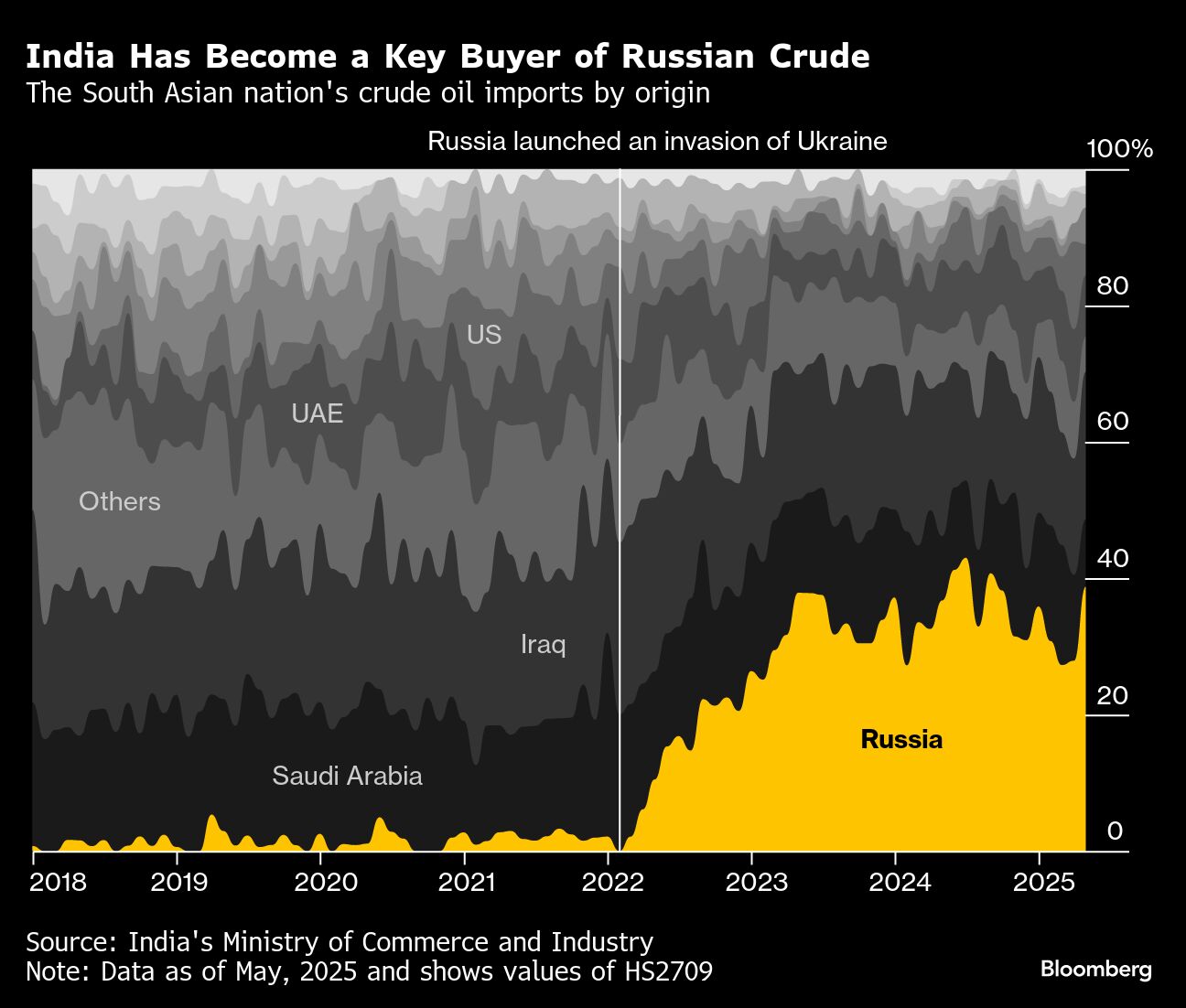
- White House adviser Peter Navarro accused India of funding Russia’s war in Ukraine through oil purchases
- The Trump administration doubled US tariffs on Indian goods to 50% to pressure India on trade and Russia
- Tariffs affect over 55% of Indian exports to the US, excluding electronics and pharmaceuticals for now
White House trade adviser Peter Navarro cranked up pressure on India to halt its purchases of Russian oil, repeating accusations that New Delhi is funding the Kremlin's campaign in Ukraine and casting the conflict as “Modi's war”.
Speaking immediately after the Trump administration doubled tariffs on India to 50% — an effort to secure concessions on trade, while also pressuring Russia — Navarro reiterated that Prime Minister Narendra Modi was funding “the war machine.”
“I mean Modi's war, because the road to peace runs, in part, through New Delhi,” Navarro said Wednesday on Bloomberg Television's Balance of Power.
By purchasing Russian oil “at a discount,” Navarro said, India helps Russia and harms the US, which in turn has to finance Ukraine.
“Everybody in America loses because of what India is doing. Consumers, businesses, workers lose because India's high tariffs cost us jobs, and factories, and income and higher wages. And then the taxpayers lose, because we've got to fund Modi's war,” he added.
The 50% tariffs, the highest reciprocal levies in Asia, will hit more than 55% of goods shipped to the US, which is India's biggest export market. While key products such as electronics and pharmaceuticals are exempt for now, the duties will hit scores of labor-intensive industries like textiles and jewelry.
The higher tariff on India came despite months of talks between New Delhi and Washington. While India was one of the first countries to open negotiations with the Trump administration, officials have expressed frustration with high levies and protectionist policies in key areas such as agriculture. Farmers are a vital voting bloc in the world's most populous country.
“What's troubling to me,” Navarro said, “is that the Indians are so arrogant about this. They say, ‘Oh, we don't have higher tariffs. Oh, it's our sovereignty. We can buy oil from anyone we want.'”
“India, you're the biggest democracy in the world, OK? Act like one,” Navarro added.

US President Donald Trump has criticised India for its purchases of Russian crude. That message that has been taken further not only by Navarro but by Treasury Secretary Scott Bessent, who has accused the country's wealthiest families of profiteering.
Russian oil is not sanctioned, and indeed purchases were tacitly encouraged by US officials after the Group of Seven nations imposed a $60-per-barrel price cap in 2022, after the invasion of Ukraine, as way of keeping supply in the market while controlling revenue that headed back to the Kremlin.
Historically, India was not a significant importer of Russian crude, depending more heavily on the Middle East, but it seized the opportunity presented to contain domestic energy costs. New Delhi has defended its ties with Russia and has called Washington's actions “unfair, unjustified and unreasonable.” It has eased, but not stopped, purchases since US criticism began to ramp up.
While India is a vital buyer of seaborne Russian crude, China remains the largest client. There, however, the Trump administration has taken a softer stance amid a broader trade dispute. The world's two largest economies have extended for 90 days a tariff truce that reduced tit-for-tat hikes on import taxes and saw them agree to ease export restrictions on rare-earth magnets and certain critical technologies.
Trump pledged to end Russia's invasion on his first day back in office, but that has failed to materialize. Despite separate face-to-face meetings with Putin and Ukrainian President Volodymyr Zelenskiy, Trump has still been unable to secure a sit-down between the two or a halt to the fighting.
While Trump has threatened to hit Russia with penalties if Putin does not move to make peace — a prospect the US president floated again on Tuesday when he warned he had “very serious” consequences in mind — he has not carried through on those pledges.
Essential Business Intelligence, Continuous LIVE TV, Sharp Market Insights, Practical Personal Finance Advice and Latest Stories — On NDTV Profit.























